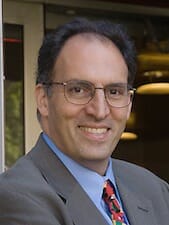An America That Asks: ‘Where Will You Do Your Service Year?’
This post is by Alan Khazei, co-chair of the Franklin Project at the Aspen Institute and CEO of Be The Change Inc.

Imagine if one day soon in our country, when a young person turns 18 the most common question they are asked is: "Where will you do your service year?" And they enthusiastically respond: "The Army. AmeriCorps. The Navy. The Peace Corps. The Marines. FEMA Corps. The Air Force. Teach For America. The Coast Guard. Youthbuild." After this week, they will be able to add Tufts University, thanks to its groundbreaking new "1+4" initiative that integrates a "bridge year of national service" right into the Tufts college curriculum.
The Aspen Institute's Franklin Project, chaired by Gen. Stanley McChrystal, and working in close alliance with the National Conference on Citizenship, ServiceNation and Voices for National Service, envisions a day when a year of national service becomes a common cultural expectation and opportunity for all young Americans.
At a time when the desire to serve far exceeds the supply of service year positions, we need to call on all sectors of our society to innovate and develop new opportunities to serve. In particular, we need to integrate national service into the fabric of the American educational system, so that national service is viewed as part of students' educational success not as something distinct from it. This week, Tufts University stepped forward with a powerful new model.
The Tufts 1+4 degree program integrates a "bridge year of service" right into the Tufts educational experience whereby students apply to Tufts and are accepted into this program upon being admitted. The students spend their first year doing national service at organizations of their choosing. Upon arrival at Tufts for their second year, they take service learning courses and are organized as a leadership cadre under the direction of Tufts' Tisch College of Citizenship and Public Service.
Importantly, if students are financial aid eligible, Tufts provides resources to support their service year to ensure that all can participate in this groundbreaking initiative. In addition to making a contribution to the nation with this program, Tufts is making an investment in leadership on their campus and for the future of our country. Tufts plans to launch with 50 students in 2015, but expects to grow the program over time.
Earlier this week, Tulane also announced the Tulane AmeriCorps Fellows Program, which is a bookend to the Tufts model as it takes the form of a "4+1" program. This fellowship allows Tulane seniors to apply for a "post- grad" service year where they stay on campus and are placed in a local non-profit, working to benefit the New Orleans community. This is a wonderful opportunity for Tulane and its recent graduates to give back to their community and represents another powerful model for universities to emulate.
Additional innovative national service pilot programs are in the process of being developed at other universities, such as William & Mary and the University of Pennsylvania. If other universities follow suit and just ten percent of all incoming freshmen to four year colleges have a service year integrated into their university experiences, this would create more than 120,000 new full-time national service opportunities every year.
Outside the realm of higher education, government leaders are also stepping up and showing strong leadership on national service. On Monday, Iowa's Gov. Branstad signed an executive order creating a Governor's Council on National Service and instructing Iowa's departments and agencies to work in partnership with the private sector to expand national service opportunities in the state. Branstad's order is bound to resonate in a state that prides itself on its strong sense of civic engagement and has one of the highest rates of volunteering in the country.
After 20 years of experience with AmeriCorps and fifty years of Peace Corps and VISTA, America is poised to fulfill the promise of large-scale civilian national service. Five years ago, Congress passed and the President signed into law in his first 100 days the strongly bipartisan Kennedy Serve America Act that promises to grow AmeriCorps to 250,000 positions a year. Congress needs to keep its promise by fully funding that law.
And thanks to the dynamic leadership of Wendy Spencer, the CEO of the Corporation for National and Community Service, and President Obama's new Presidential Task Force on national service, new federal agency corps, such as FEMA Corps and School Turnaround AmeriCorps have been launched and others are in the works.
Cisco has generously provided over two million dollars to fund a new national service technology platform that will allow more non-profits to join the national service movement, and encourage organizations and individuals to develop new service opportunities. Investments in national service bring multiple benefits as research has shown that every dollar invested in national service programs brings in a societal return equivalent to nearly $4.
As Gen. McChrystal emphasized in his speech at Tufts this week, it is time for America to commit to the "big idea" of national service as a new rite of passage for America's youth. It is the best way to instill a strong ethic of citizenship, unite us as a country and address pressing problems as each generation experiences the power of shared service and sacrifice for their communities, country and the common good.
It will take all sectors and institutions stepping forward in ways large and small for this vision to become a reality. Tufts and Tulane are providing important leadership. Hopefully others will follow their example and contribute to this growing movement so that one day soon every young American will be able to answer proudly when asked "where will you do your service year?"
This essay originally appeared on The Huffington Post.
